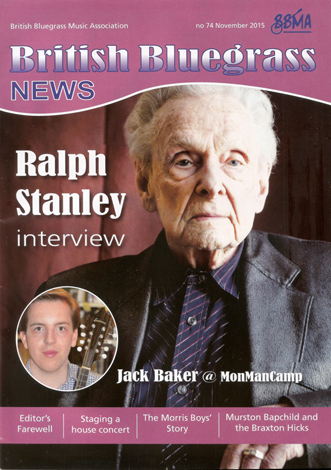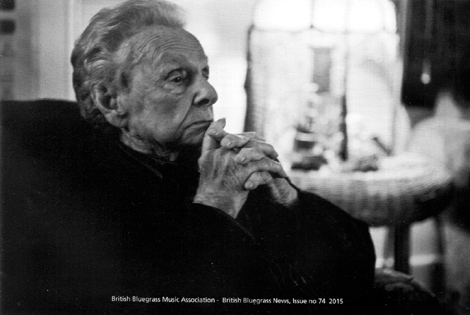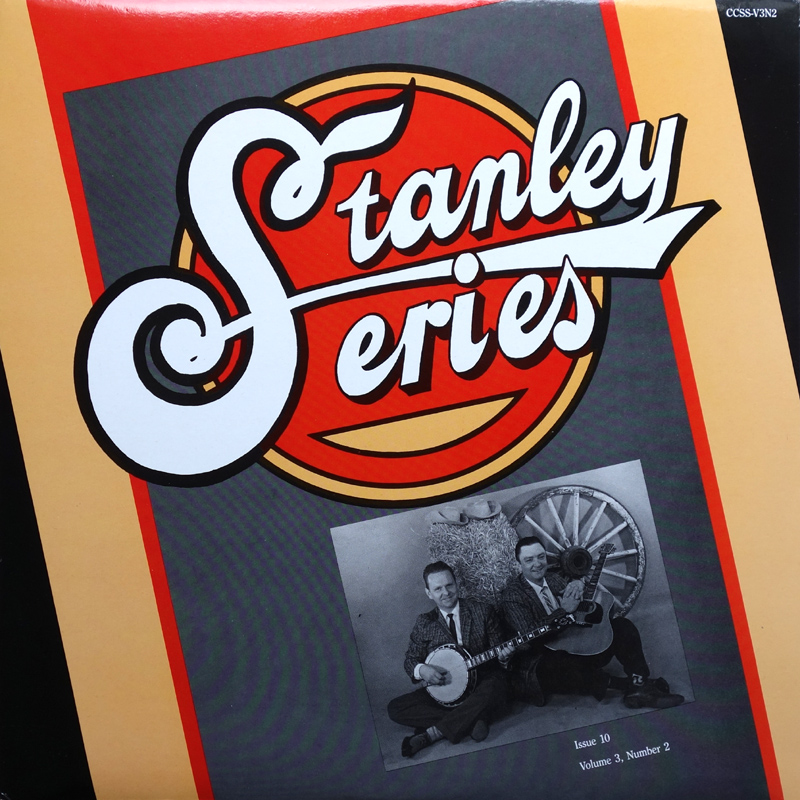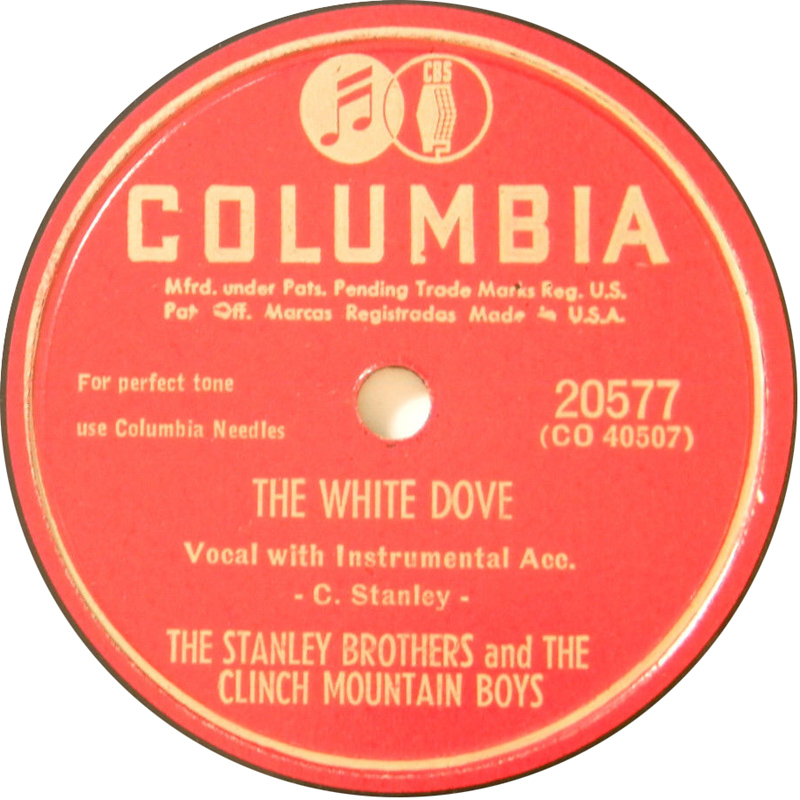- Bill Gatton Chevy Show
- Carter Stanley Interview - 1966
- How Far To Little Rock? - Search live shows
- Jim Kent's film 'Ralph Stanley's Bluegrass Festival'
- New WCYB Recording
- Pound Va. 1972 - Video
- Replica Rebel T-Shirt
- R.I.P. Ralph
- Roy Lee Centers Last Show
- Song & Memory Books
- Stanley Brothers - WCYB Acetate
- Stanley Standard - Carter Stanley Memorial Issue
- Suwannee River Jamboree
- Up In The Cloud - 1957-62
A Conversation with... Dr. Ralph Stanley
BBMA - British Bluegrass News, Issue No 74, November 2015
By Heather Bristow

At the 2016 Tamworth Bluegrass Festival, I picked up a free sample copy of the 'British Bluegrass News', a quarterly magazine, which is sent to members of the British Bluegrass Music Association (BBMA).
I was quite surprised and delighted to see that it had an interview with Ralph...
The BBMA is an organisation which aims to support and promote bluegrass activity in the United Kingdom and makes information about bluegrass music available to the general public (mostly festival dates etc).
Thanks to Dave Teague (BBMA Chairman) for permission to reproduce the article and to Heather Bristow for the interview... For more information on the BBMA see:
http://www.britishbluegrass.co.uk
Here's the article...
Heather Bristow talks with the iconic three-time Grammy-winner and bluegrass music legend, Dr. Ralph Stanley
HB: Greetings from England, and thank you so much for taking the time. You have many fans over here, Dr. Stanley. As an ex-pat myself (originally from North Carolina), I am curious as to how you find the bluegrass music scene over in Britain and how you have found audiences here. Is is not amazing to think that the "old-timey, hill-billy mountain music" of your childhood has crossed the pond and is played here, revered over here, that people try to emulate your style both vocally and on the banjo?
RS: I've performed in Europe seven or eight different times and we had very good crowds each time. To my knowledge, we sold each event out. I remember everyone treated us very well, the fans were familiar with my music, and I would like to come back over there and perform again.
HB: For myself I have always found the music to be a language all it's own in so much as you can sit and pick with people who don't speak the same spoken language but do speak bluegrass. Do you find that as well and do you still like to sit and pick with folks? I Also find that sometimes people can be a little knee-jerk in their reaction to mention of bluegrass and gospel music, and yet take away the label and folks really appreciate the music and the harmonies.
RS: Music is a language all to its own. It does bring people from all over together. Gospel music has been a big part of my career and always will be. My fans love it, I'm very glad they do. I think sometimes folks forget just how well loved bluegrass and gospel music really is.
HB: As with many forms of popular music, it seems the rising stars get younger and the style amalgamates into various forms (progressive, jazzy, etc.) that stray far away from the original music. How do you feel about that?
RS: Well, I'm not a big fan of this new music. I'm not saying there is a thing wrong with it, it just doesn't catch my ear or move me. I'm proud to see all the young kids that are having success with it.
HB: I see that your retirement tour of the autumn 2013 (which didn't end up being a farewll tour) had a stop in my hometown of Rocky Mount, N.C. Having gone back home to visit family over Christmas, I made a visit to Rocky Mt. and was sad to see this once booming city, which built its fortunes on cotton and tobacco, now sadly on the decline. Do you feel that your own fame and the prominence/popularity of bluegrass music in your neck of the woods has been a benefit to the area (largely supported by mining and logging during your childhood), ie brought fans and pilgrims of the music to seek out your own home and to find the roots of this wonderful music?
RS: Yes, that was my original plan. After praying about it I just couldn't quit. My hometown of Clintwood, Virginia has a Ralph Stanley Museum there and it has brouhgt a lot of people into that town. People from all over the world has come and visited my museum. The folks who work in the coal mines usually are big supporters of bluegrass music.
HB: How did you feel when O Brother Where Art Thou? really brought bluegrass to the mainstream public? Do you think that changed the music, having it become so popular, so trendy, with that film? It must have been very satisfying, very pleasing to have been able to do O Death in the manner you wanted - a capella - and to have it win a Grammy based on that rendition.
RS: I think "Oh Brother Where Art Thou" really put bluegrass music back on the map. Like you said, it made it mainstream. It was a godsend to us. My audiences tripled after that movie came out. Since that came out, we play much larger venues, and our audiences have a lot of young folks in attendance. The Grammy was a major highlight for me. I'm very proud of it.

HB: I have read in various interviews that you learned to play/sing by ear. Did you ever learn to read music? Do you think that makes a difference, whether or not people can "read the dots"? How did you feel about the awards of your honorary doctorates, especially from prestigious Yale?
RS: I never could read music, I just learned by ear. I don't guess there is anything wrong with sheet music, I cannot do it, but a lot of folks can. I just do it the natural way. I'm proud of both of my doctorates. I received my first one from Lincoln Memorial University in Heritage, TN around 1976. Then, last year my second one came from Yale University. Both were proud moments for me.
HB: When your brother sadly passed away, you weren't 100 percent sure about going it alone musically - was it the encouragement of fans (and support of your manager) that convinced you that you could? Did you feel quite competitive with Carter while you were singing together?
RS: Carter was always the front man of the show. He would do all of the MC work, etc. I always would do the background work like all of the business. We made a great team. When he passed away, I had my doubts about continuing playing music. I received thousands of letters from fans saying that they would support me more than they supported the Stanley Brothers. So I'm glad I continued on. With the help of the Good Lord and the fans I've been blessed to do a lot.
HB: Sibling harmony is pretty special - have you ever found anyone to sing with that felt like singing with Carter? Was that really difficult?
RS: Sibling harmony is very special. My son Ralph Stanley II used to sing lead with me and now my grandson Nathan Stanley does. Ralph II was a big fan of Carter and Keith Whitley (who also sang lead with me) so he would try to sound like them. He did a fine job though. Nathan sings a song the way he feels it. Which I've always told him to do that. He doesn't try to copy anybody, he just sings it like Nathan. I have had so many people come up and tell me that Nathan sounds like me or sounds like Carter. Nathan is like me, he does not want to be a copy-cat. Both Nathan and Ralph II do s fine job.
HB: I have read that you feel that you play the banjo like a singer, in that you try to focus on the melody like a lead singer would. Do you still feel that way and is it because you consider yourself a singer first and foremost?
RS: That's right. When I use(d) to play the banjo I would focus 100 percent on the melody and not worry about hitting any fancy licks. Yes, I would consider myself a singer now these days. I haven't played banjo in a while. By not having the banjo in my hands I can focus on putting more feeling into my singing.
HB: The music business is a very different scene these days. Do you feel that its still possible for musicians to earn their living as you have or that there are too many trying to do just that? How do you feel about social media and self promotion?
RS: When I first started travelling, it was tough. Things are so much better now, and everyone has it easier now. I could not tell you the first thing about Facebook or Twitter. I understand that I have one, but I don't know how to operate them. It seems like they help things a lot by getting word out about concerts, etc.
HB: When choosing material that is not your own, what draw's you to a certain song? Is gospel music still your first love, favourite thing to sing? How exciting is it to think that your singing of a gospel song can convert someone to a believer?
RS: I would rather sing gospel music. I've had so many fans come up to me after my concerts and tell me that when they first came to my concert they were non-believers. Now, they will meet me in Heaven. I believe the Lord works through me to touch people with the songs I sing.
HB: Do you still enjoy being on the road and performing? Are you going to come to England any time soon?
RS: I would much rather be performing than sitting at home doing nothing. Music is all I've ever known. I'll continue to tour until the good Lord calls me home. I would love to come back to Europe for another tour again.
HB: Tell us something unusual about yourself.
RS: I'm a very quiet person. I don't talk a lot, I like to listen to everyone around me. You learn more that way.
HB: Thank you, again, for taking the time and God Bless!









